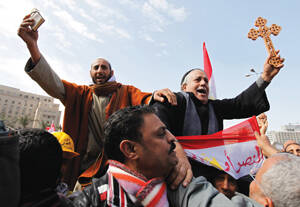The end of the 30-year reign of Hosni Mubarak in Egypt has led to an outpouring of new hope for the future of a democratic Egypt even as it has raised new uncertainties about the fate of the nation’s Christian minority. Coptic leaders were initially reluctant to support the spontaneous people-power movement against Mubarak. Many of their parishioners, however, were eager to join Muslims in Cairo’s Tahrir Square in the demonstrations that led to Mubarak’s dramatic ouster. Even as the Mubarak regime began its death spiral, the church’s head in Egypt, Pope Shenouda III, offered his support to the regime in an interview with state television, apparently deciding Egypt’s Coptic community had more to fear from a resurgent Muslim Brotherhood than a continuing Mubarak dynasty.
During the uprising, there were many instances of Christian and Muslim cooperation, but after Mubarak resigned on Feb. 11, some of the worst fears about the potential for sectarian tension in his absence were realized. A number of clashes erupted between Copts and Muslims, and a Coptic priest was found brutally slain in his home. On March 12 the Shahedin Church in Helwan Province was burned, the final act in a communal feud that had its origins in a dispute over a romantic relationship between a Coptic man and a Muslim woman. After the church arson, “some of the Muslim mobs in the area took the land and put [up] a sign that it’s now a mosque,” said Michael Meunier, president of the U.S. Copts Association. When Copts demonstrated for greater security in response, stone-throwing between angry Muslims and demonstrators began and security forces intervened. In the resulting chaos, 13 people were killed, including both Muslims and Christians.
Other demonstrations began outside government media offices in Cairo by Copts demanding the rebuilding of the church and an end to what they called government persecution and discrimination. Those demonstrations were voluntarily suspended by Copts after negotiations with government officials, but violence still broke out as Egyptian military personnel swept through the protesters’ camp before they could depart. Many Copts were injured seriously.
Despite the turmoil, there are signs that Egypt’s new leaders recognize that stronger efforts are required to protect communal harmony as the nation tries to regain its footing. Sheikh Ahmad al-Tayyib, the grand imam of Al Azhar University in Cairo, issued a statement on condemning the attack on the church as “a distortion of Islam” and calling on Muslim residents to help rebuild the church and to refrain from sectarian violence. Egypt’s new prime minister, Essam Sharaf, met with the protesting Christians in Cairo and assured them he would speak to the military council about taking back the land and rebuilding the church.
Meunier said, “That’s the first time a seated prime minister has addressed any protesters in Egypt.” Meunier added that the prime minister appeared to be sincerely trying to address the problems of Egypt’s minority Copts, but “he’s not fully authorized. It’s still the military council that holds all the cards.” Soon after the prime minister’s outreach, Egypt’s military in fact agreed to assume responsibility for restoring the church.
The Rev. Nabil Fayez Antoun, the national director for the Pontifical Mission Societies, assessed the “tense” conditions in Egypt. He said the “youth revolution” released potent forces long suppressed in Egyptian society. “[W]e are undergoing a very confusing phase which is difficult to navigate. However, we hope that reason will prevail over violence.” Father Nabil added, however, that with all the change being pressed upon Egypt, perhaps some room to breathe could also open up for Christians.








